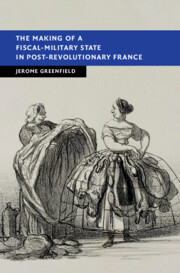Book contents
- The Making of a Fiscal-Military State in Post-Revolutionary France
- New Studies in European History
- The Making of a Fiscal-Military State in Post-Revolutionary France
- Copyright page
- Contents
- Figures and Tables
- Acknowledgements
- Abbreviations
- Chapter 1 The Nineteenth-Century French State and Its Rivals
- Chapter 2 The Revolutionary Quest for Fiscal Stability, 1789–1799
- Chapter 3 Developing a Post-Revolutionary Fiscal Politics, 1799–1814
- Chapter 4 Recasting the Fiscal-Military System, 1814–1821
- Chapter 5 The Resurgence of French Power, 1821–1830
- Chapter 6 The 1830 Revolution and the Limits of Fiscal Reform
- Chapter 7 The Ascent of the Interventionist Orleanist State, 1830–1848
- Chapter 8 The Rise and Fall of Austerity, 1848–1856
- Chapter 9 Reaching the Limits of the Fiscal-Military System, 1856–1871
- Chapter 10 The Triumph of the Notables
- References
- Index
Chapter 7 - The Ascent of the Interventionist Orleanist State, 1830–1848
Published online by Cambridge University Press: 25 August 2022
- The Making of a Fiscal-Military State in Post-Revolutionary France
- New Studies in European History
- The Making of a Fiscal-Military State in Post-Revolutionary France
- Copyright page
- Contents
- Figures and Tables
- Acknowledgements
- Abbreviations
- Chapter 1 The Nineteenth-Century French State and Its Rivals
- Chapter 2 The Revolutionary Quest for Fiscal Stability, 1789–1799
- Chapter 3 Developing a Post-Revolutionary Fiscal Politics, 1799–1814
- Chapter 4 Recasting the Fiscal-Military System, 1814–1821
- Chapter 5 The Resurgence of French Power, 1821–1830
- Chapter 6 The 1830 Revolution and the Limits of Fiscal Reform
- Chapter 7 The Ascent of the Interventionist Orleanist State, 1830–1848
- Chapter 8 The Rise and Fall of Austerity, 1848–1856
- Chapter 9 Reaching the Limits of the Fiscal-Military System, 1856–1871
- Chapter 10 The Triumph of the Notables
- References
- Index
Summary
While the foundations of the fiscal-military state changed little either side of 1830, the new Orleanist regime did much to extend the state’s developmental dimension. The government took responsibility for the development of the railway network, which entailed extensive public investment in the 1840s. In part, this extension of public works was motivated by a desire to manage the ‘social question’, the fear of a potentially subversive underclass; indeed, despite the limited extension of the franchise after 1830, the July Monarchy was attentive to public opinion. The desire for popular legitimation also pushed the regime to seek glory abroad through the conquest of Algeria, which entailed higher military expenditure, as did an international crisis in 1840. As under the Restoration, the growth of public expenditure was financed through credit, which enabled the government to avoid painful tax reforms, while increasing the numbers of people invested in public credit and thus with a stake in the social and political order.
Keywords
- Type
- Chapter
- Information
- Publisher: Cambridge University PressPrint publication year: 2022

